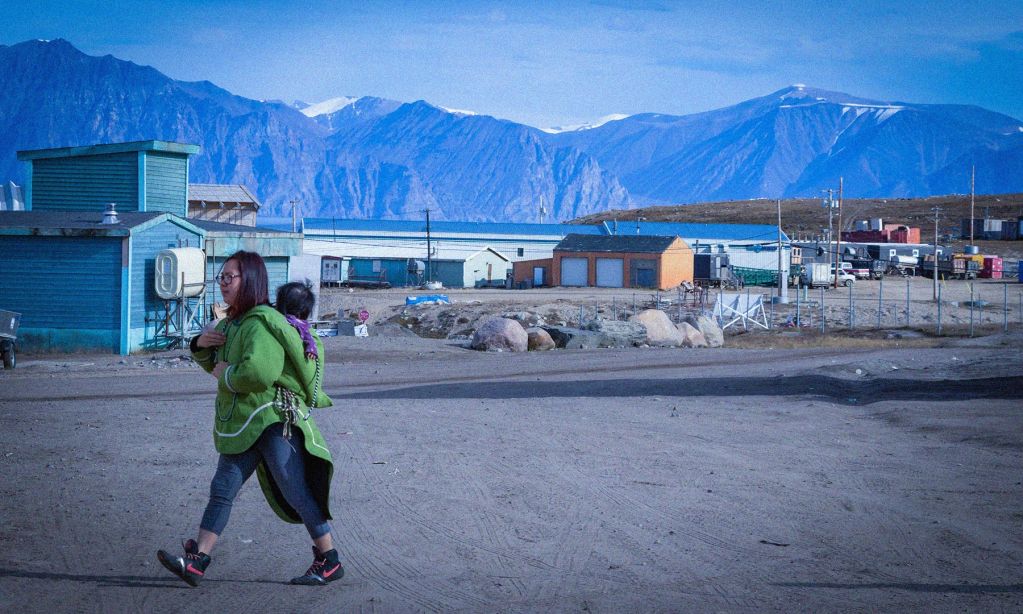Along a mining road in Nunavut, truckers move gold ore from its extraction point to a mill for processing.
Whale Tail, the site where the metal is pulled from the earth, is a satellite mine to the older Meadowbank project, which operated from 2010-2018. Workers haul ore from Whale Tail to the mill at the old Meadowbank mine site. The high traffic haul road is 50 km long and intersects with the migratory paths of several herds of barren ground caribou, an invaluable resource for the nearby Inuit community of Baker Lake.
When the Whale Tail mine was first approved in 2018, the proponent, Agnico Eagle Mines Ltd. repeatedly committed to working with a stakeholder advisory group to ensure “zero harm” to caribou. Once the mine began production, the company switched its rhetoric about zero harm with arguments about the need to balance environmental protection with project economics.
Monitoring documents make clear that Agnico Eagle violated project terms and conditions by unilaterally relaxing caribou protection measures on several instances. In 2020 the company attempted to weaken requirements—which were outlined in its approved management plans—for closing the haul road during caribou migrations, without first consulting the advisory group as they were required to do. Inuit organizations and the Government of Nunavut pushed back and forced Agnico Eagle to withdraw these changes, but the company still failed to fully implement protection measures for over 22,000 caribou—almost 40 per cent of the caribou that migrated through the project area that year.
These actions sparked frustration and concern from Inuit organizations and the Government of Nunavut, most notably in written comments to the Nunavut Impact Review Board (NIRB). Created by the 1993 Nunavut Land Claims Agreement, the NIRB is the co-management board responsible for the Environmental Impact Assessment of mining projects in Nunavut. NIRB screens and reviews proposals for mineral exploration and mining in Nunavut, and makes recommendations to the federal government regarding whether projects should be approved and, if so, under what conditions. It is the federal government that ultimately decides whether mining projects should be approved. Canada is also responsible for enforcing project terms and conditions, with NIRB playing an important role in oversight and monitoring.
The Government of Nunavut, Kivalliq Inuit Association, and Baker Lake Hunters and Trappers Organization regularly identified and expressed deep concern in written submissions to NIRB around Agnico Eagle’s monitoring deficiencies and the company’s failures to properly implement management plans to protect caribou. The Government of Nunavut repeatedly urged NIRB to intervene and direct Agnico Eagle to adhere to the terms and conditions of its project certificate. The NIRB paid little attention to these submissions, which raises broader questions around the implementation and enforcement of terms and conditions for mining projects in Nunavut.
In October 2022, the Deputy Minister of Environment for the Government of Nunavut wrote to NIRB and Crown Indigenous Relations and Northern Affairs Canada (CIRNAC), requesting that NIRB direct Agnico Eagle to implement the required mitigation measures pertaining to caribou. They also asked CIRNAC to fulfill their mandate under the Nunavut Planning and Project Assessment Act and ensure the mine’s compliance with its project terms and conditions.
CIRNAC subsequently conducted an investigation into non-compliance at the Whale Tail mine, which concluded in May 2023 that Agnico Eagle was not complying with project terms and conditions regarding caribou. The report included an order requiring the company to “implement diligently the Terrestrial Ecological Management Plan” for the Whale Tail project. It concluded that Agnico Eagle’s actions amounted to “non-compliance and willful disobedience” that had harmed caribou.
The federal investigation identified numerous instances of non-compliance. In 2019 the haul road was ‘closed’ for 92 days due to the presence of migrating caribou. However, on 82 of those days non-essential traffic—including convoys of haul trucks—continued to use the road. In both 2018 and 2019, Agnico Eagle did not carry out road surveys for caribou with the required frequency. One road received no surveys at all in summer 2018.
The investigation also identified serious deficiencies in the quality of monitoring and research conducted by Agnico Eagle to inform their environmental management and mitigate negative impacts. The company had chronic issues with data reporting, missing information, and misleading analyses—which also made it difficult to verify if the management plan was being followed, and to assess if mitigation measures were effective.
In 2018, the company used incorrect seasons and time frames for caribou road surveys, leading to “misleading statistical analysis.” Agnico Eagle reported that caribou numbers during the 2019 spring and fall migrations were “the highest since surveys began”, suggesting mitigations were successful; however, after reviewing the data the federal investigator found this to be “factually incorrect and misleading.” And in a written statement cited in the federal investigator’s report, the Government of Nunavut described important conclusions about caribou interactions with road infrastructure in the company’s 2019 report, conclusions made without any supporting data, as “a concerning trait that leads to unnecessary confusion and disinformation amongst reviewers, regulators and the public at large.”
The federal order affirms that the company must comply with all project terms and conditions, including implementing approved management plans, and may not unilaterally and arbitrarily weaken or remove protection measures. However, it does not include any penalty—which reflects the reality that companies often suffer little consequence for repeated non-compliance. It is unclear whether the federal order will result in mining companies like Agnico Eagle changing their approach to monitoring and mitigation at mining projects in Nunavut.
Part of the significance of the order lies in the fact that it is directed to Agnico Eagle. The company owns and operates two of the three operating mines in Nunavut, one mining project currently in care and maintenance, and numerous mineral exploration projects in the territory. Because of its substantial role in the territorial economy, Agnico Eagle holds a considerable amount of political and economic power over governance institutions in Nunavut.
The problem of non-compliance in Nunavut is also not limited to Agnico Eagle. In a recent book with Inuk Elder Joan Scottie and social scientist Jack Hicks, Bernauer documented several examples where mineral exploration companies—some operating in critical caribou habitat that the Baker Lake Hunters and Trappers Organization is fighting to protect from the mining industry—repeatedly violated terms and conditions regarding project clean-up, fuel storage, and wildlife monitoring/reporting.
The system for monitoring and enforcement at mines in Nunavut is in urgent need of reform. There are numerous instances where parties could have acted differently. Most notably, NIRB could have acted on the comments and concerns from the government of Nunavut and Inuit organizations, clearly directed the company to implement required mitigation measures, and promptly notified federal authorities of problems with non-compliance.
Because it has—rather paternalistically—retained jurisdiction over mining in Nunavut, it is ultimately the federal government’s responsibility to repair the regulatory system. Canada owes the Inuit of Baker Lake, and all of Nunavut, an explanation of how it will uphold their treaty rights and end these widespread problems with non-compliance.









